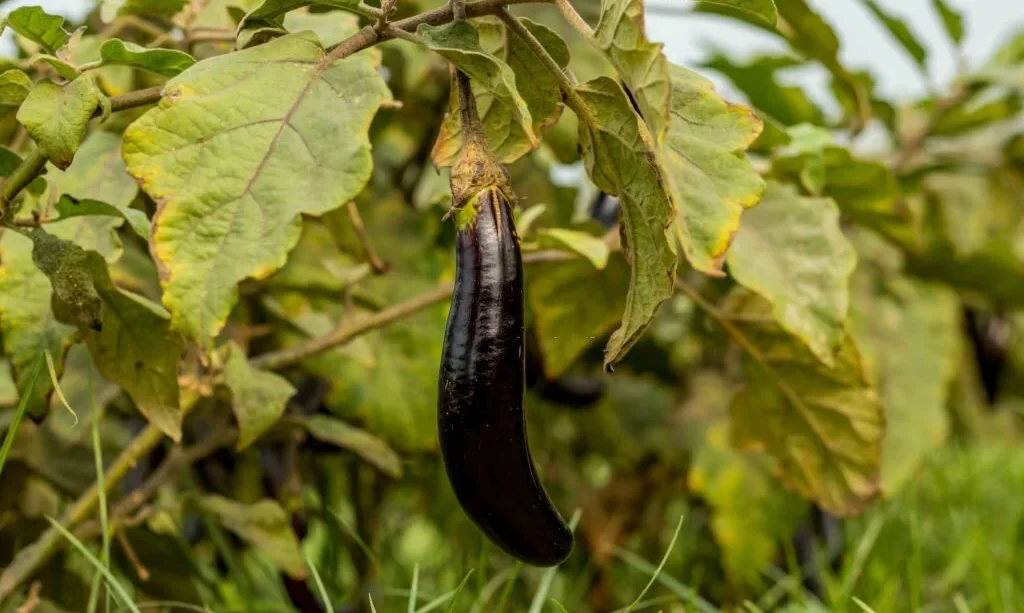Eggplants, with their rich, earthy flavor and versatility in the kitchen, are a favorite addition to many gardens. Achieving the best taste and texture in your eggplants depends on knowing when to harvest them. In this guide, we’ll focus on a specific variety: ‘Black Beauty’ eggplants. We’ll explore the nuances of determining their readiness for harvest and provide you with the insights you need to savor these glossy, dark-purple to black gems at their prime.
Eggplant Variety: ‘Black Beauty’
‘Black Beauty’ is a popular eggplant variety cherished for its striking appearance and delectable taste. These eggplants are known for their dark-purple to black skin, which has a glossy, almost polished appearance. This variety typically produces medium-sized, oval-shaped fruits that are not only visually appealing but also offer a delightful flavor profile. Understanding the unique characteristics of ‘Black Beauty’ eggplants is crucial in determining the ideal time for harvesting them to achieve the perfect balance of flavor and quality.
Determining Maturity
The key to harvesting ‘Black Beauty’ eggplants at their peak is recognizing the visual cues that signify their maturity. These cues include:
- Color: ‘Black Beauty’ eggplants should have a deep, dark-purple to black skin. As they ripen, this dark hue becomes more pronounced. Avoid harvesting them when they are still green or when the skin is pale.
- Size: A typical ‘Black Beauty’ eggplant is usually around 4 to 6 inches in length and 3 to 4 inches in width. When they reach this size, they are generally ready for harvest. However, it’s crucial to consider other factors along with size.
- Skin Texture: Gently press your finger against the eggplant’s skin. A ripe ‘Black Beauty’ eggplant should have firm, smooth skin. If the skin is wrinkled or dimpled, it may be overripe.
These visual cues are strong indicators of an eggplant’s readiness for harvest. While size is a useful guideline, the depth of color and skin texture are equally important factors to consider. Harvesting ‘Black Beauty’ eggplants when they exhibit these characteristics ensures you’ll enjoy their exceptional flavor and quality in your culinary creations.
Harvesting ‘Black Beauty’ Eggplants
Harvesting ‘Black Beauty’ eggplants is a delicate process that requires attention to detail. To ensure you collect them at their peak flavor and quality, follow these steps:
- Use the Right Tools: It’s best to use pruning shears or a sharp knife to cut the eggplants from the plant. This method minimizes damage to the plant and ensures clean cuts.
- Handle with Care: Treat ‘Black Beauty’ eggplants gently to avoid bruising or puncturing the skin. Damaged eggplants are more susceptible to spoilage and may not store well.
- Cut the Stem: When harvesting, be sure to leave a short section of the stem attached to the fruit. This stem, often referred to as the calyx, helps prolong the eggplant’s freshness and reduces the risk of moisture entering the fruit.
Timing Considerations
Timing is crucial when harvesting ‘Black Beauty’ eggplants. The optimal time for harvesting these delectable vegetables typically depends on various factors:
- Days to Maturity: ‘Black Beauty’ eggplants typically reach maturity 60 to 85 days after transplanting or around 120 to 150 days from seed. Monitoring the days since transplanting or planting can give you a general idea of when to expect your eggplants to be ready for harvest.
- Visual Cues: As discussed earlier, rely on visual cues such as the eggplant’s color, size, and skin texture to determine readiness. Once the eggplants have developed their characteristic dark-purple to black skin, reached the appropriate size, and exhibit smooth, firm skin, they are likely ready for harvest.
- Regular Monitoring: Frequent monitoring of your ‘Black Beauty’ eggplants is essential. This practice allows you to assess the ripeness of individual fruits as they mature at different rates. Harvesting should be an ongoing process during the growing season.
- Avoiding Overripeness: It’s important not to let ‘Black Beauty’ eggplants remain on the plant for too long. Overripe eggplants may develop a bitter taste and have a tougher texture. Harvesting them at their peak ensures the best culinary experience.
By paying close attention to these timing considerations and following proper harvesting techniques, you can enjoy the exquisite flavor and quality that ‘Black Beauty’ eggplants have to offer. Whether you plan to use them in stir-fries, grilled dishes, or your favorite eggplant recipes, you’ll savor the delicious results of your gardening efforts.
Post-Harvest Handling
Once you’ve successfully harvested your ‘Black Beauty’ eggplants, it’s essential to handle and store them with care to maintain their flavor and quality:
- Washing: Before using or storing your eggplants, gently rinse them with cool water to remove any dirt or debris. Ensure they are completely dry before storing them.
- Refrigeration: Store ‘Black Beauty’ eggplants in the crisper drawer of your refrigerator, preferably in a plastic bag to maintain optimal humidity. Keep in mind that these vegetables are sensitive to cold temperatures, so store them at around 50°F (10°C).
- Shelf Life: ‘Black Beauty’ eggplants have a limited shelf life, typically up to one to two weeks when stored correctly. It’s best to use them as soon as possible to enjoy their peak flavor.
By following these post-harvest handling practices, you can extend the freshness of your ‘Black Beauty’ eggplants and reduce the risk of spoilage. With a little attention to detail, you can maximize your culinary enjoyment from your homegrown eggplants.
Conclusion
Harvesting ‘Black Beauty’ eggplants at the right time is a rewarding experience for gardeners and food enthusiasts alike. The vibrant, dark-purple to black skin of these eggplants signifies their readiness for picking, and their unique flavor and texture make them a prized addition to countless recipes. By understanding the visual cues that indicate maturity, employing gentle harvesting techniques, and carefully handling and storing your freshly harvested eggplants, you can take full advantage of the delightful qualities that ‘Black Beauty’ eggplants offer. Whether you’re preparing mouthwatering dishes on your own or sharing your homegrown produce with friends and family, harvesting ‘Black Beauty’ eggplants at their peak ensures a culinary experience filled with rich and savory delights.



